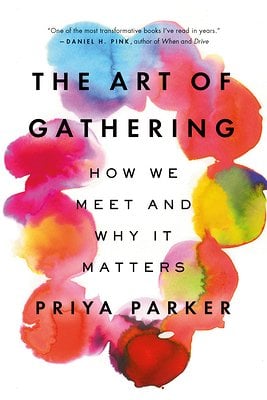If you’ve ever been to a conference, you’ve probably noticed that the most memorable, helpful, and productive parts happen in the hallways, between planned sessions, when you meet someone new and engage authentically. You may have also noticed that often the planned conference sessions leave you bored and disengaged. Why do so many conferences fail to inspire? Priya Parker has some answers.

I first ran across Priya Parker’s name while reading an article in the Washington Post about a bipartisan Congressional committee that actually manages to function in a constructive way. Parker was mentioned as an advisor to this committee. I was intrigued since “Priya” is a common Indian name. I looked her up and sure enough, her mother is from India. In the article, Parker is described as a “master facilitator.” I was even more intrigued, because I’m curious about ways to get people to work together more effectively.
I acquired a copy of her book, The Art of Gathering. Because of her unusual upbringing (shuttling between divorced parents of different ethnicities, spiritual beliefs, and political inclinations), she has spent her life figuring out the best ways for disparate people to come together for meaningful, productive conversations. Her book is for gatherings of all kinds, from friends and family, to political, to corporate. I thought some of her ideas might help me create better gatherings during the classes I teach.
Parker emphasizes that the important parts of a gathering are not the venue, food, and decorations, but rather the purpose and the people who are invited. She recommends a variety of opening and closing rituals, temporary rules, and conversational “games” to help people share authentically and make decisions collectively. She illustrates her ideas with examples from her own work and the work of others.
One of my favorite ideas is “Don’t be a chill host.” In other words, don’t be a host that sits back, acts like they’re not really invested, and lets things happen. “ ‘Chill’ is selfishness disguised as kindness,” she says, pointing out that being “chill” is a way to avoid the risk of embarrassing oneself by trying too hard. “I urge those I advise to own their power and lift a hand to the wheel” (pp. 71-72).
Helping people connect authentically and communicate more effectively is crucial to creating a better world for all. Technology won’t save us if we can’t come to agreement on how best to use it to benefit humans and the planet. Books like Parker’s can show us a way to work together to create a more fulfilling, engaged, inspiring future.
